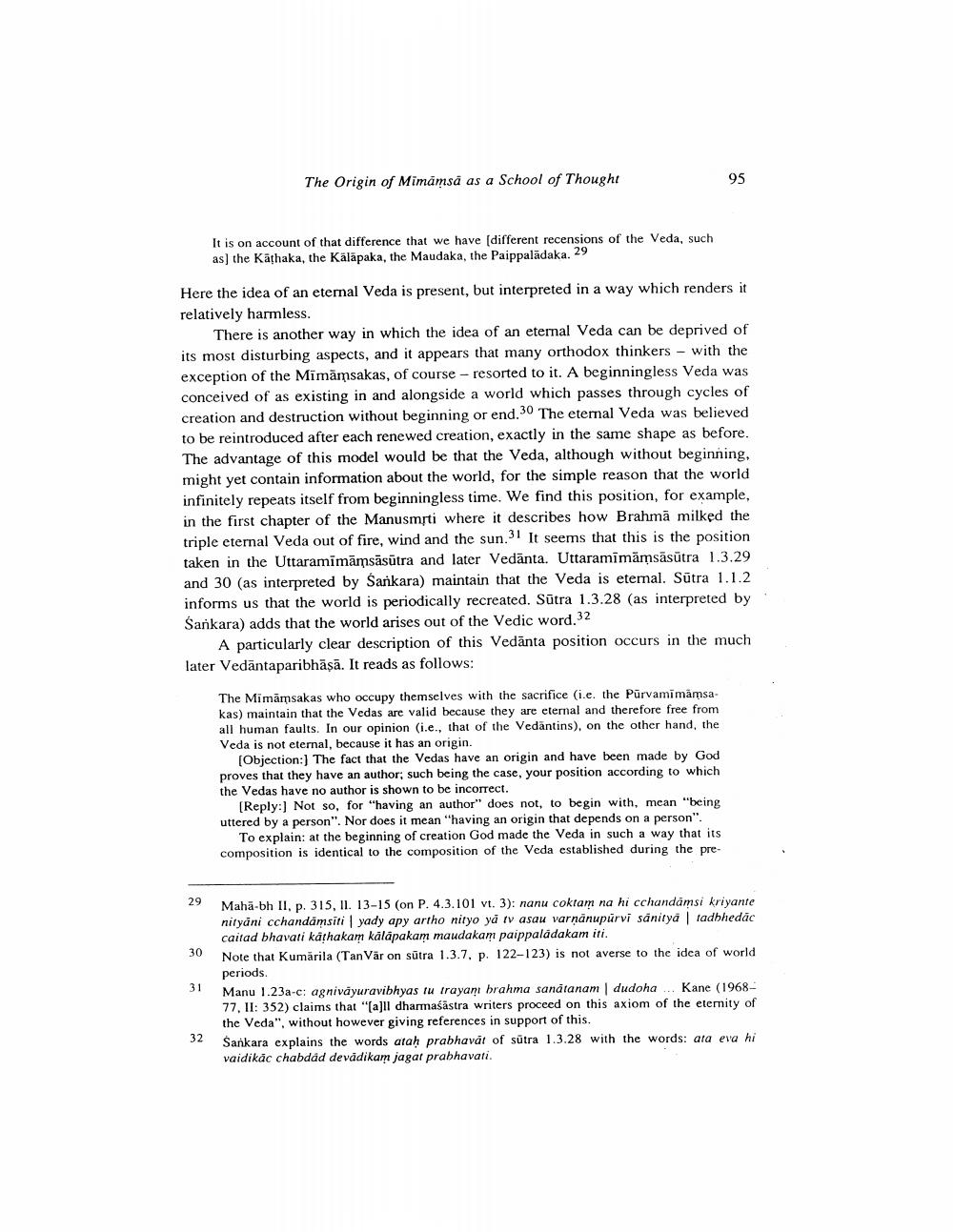________________
The Origin of Mimämsä as a School of Thought
Here the idea of an eternal Veda is present, but interpreted in a way which renders it relatively harmless.
It is on account of that difference that we have [different recensions of the Veda, such as] the Kathaka, the Käläpaka, the Maudaka, the Paippalādaka. 29
There is another way in which the idea of an eternal Veda can be deprived of its most disturbing aspects, and it appears that many orthodox thinkers - with the exception of the Mimamsakas, of course - resorted to it. A beginningless Veda was conceived of as existing in and alongside a world which passes through cycles of creation and destruction without beginning or end.30 The eternal Veda was believed to be reintroduced after each renewed creation, exactly in the same shape as before. The advantage of this model would be that the Veda, although without beginning, might yet contain information about the world, for the simple reason that the world infinitely repeats itself from beginningless time. We find this position, for example, in the first chapter of the Manusmrti where it describes how Brahma milked the triple eternal Veda out of fire, wind and the sun.31 It seems that this is the position taken in the Uttaramīmāmsāsūtra and later Vedanta. Uttaramīmāmsāsūtra 1.3.29 and 30 (as interpreted by Sankara) maintain that the Veda is eternal. Sūtra 1.1.2 informs us that the world is periodically recreated. Sūtra 1.3.28 (as interpreted by Sankara) adds that the world arises out of the Vedic word. 32
30
A particularly clear description of this Vedanta position occurs in the much later Vedantaparibhāṣā. It reads as follows:
31
32
95
The Mimamsakas who occupy themselves with the sacrifice (i.e. the Pūrvamimämsakas) maintain that the Vedas are valid because they are eternal and therefore free from all human faults. In our opinion (i.e., that of the Vedantins), on the other hand, the Veda is not eternal, because it has an origin.
[Objection:] The fact that the Vedas have an origin and have been made by God proves that they have an author; such being the case, your position according to which the Vedas have no author is shown to be incorrect.
29 Maha-bh II, p. 315, II. 13-15 (on P. 4.3.101 vt. 3): nanu coktam na hi echandāmsi kriyante nityäni cchandāmsiti | yady apy artho nityo ya tv asau varṇānupurvi sanityä | tadbhedāc caitad bhavati kathakam käläpakam maudakam paippaladakam iti.
Note that Kumārila (Tan Vär on sūtra 1.3.7, p. 122-123) is not averse to the idea of world periods.
Manu 1.23a-c: agnivayuravibhyas tu trayam brahma sanatanam | dudoha... Kane (196877, II: 352) claims that "[a]ll dharmasastra writers proceed on this axiom of the eternity of the Veda", without however giving references in support of this.
[Reply:] Not so, for "having an author" does not, to begin with, mean "being uttered by a person". Nor does it mean "having an origin that depends on a person".
To explain: at the beginning of creation God made the Veda in such a way that its composition is identical to the composition of the Veda established during the pre
Šankara explains the words ataḥ prabhavat of sutra 1.3.28 with the words: ata eva hi vaidikāc chabdad devadikam jagat prabhavati.




